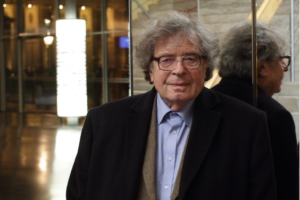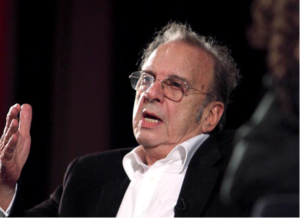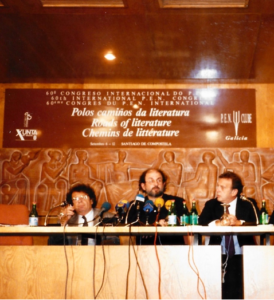Posts Tagged ‘Aziz Nezin’
PEN Journey 9: The Fraught Roads of Literature
PEN International celebrates its Centenary in 2021. I’ve been active in PEN for more than 30 years in various positions and now as an International Vice President Emeritus. With memories stirring and file drawers of documents and correspondence bulging, I am a bit of a walking archive and have been asked by PEN International to write down memories. I hope this personal PEN journey might be of interest.
Twelve-foot puppets danced outside the dining room’s second floor windows at our hotel, billed as the “oldest hotel in the world,” set on the central plaza of Santiago de Compostela, Spain, the venue for PEN International’s 60th Congress.
Sara Whyatt, coordinator of PEN’s Writers in Prison Committee, and I hurried to finish breakfast and our agenda before we joined the crowds outside at the historic Festival of St. James. That evening International PEN’s 60th Congress would convene. Hosted by Galician PEN, the Congress had as its theme Roads of Literature, which seemed appropriate as pilgrims from around the world also gathered on the Obradoiro Plaza in front of the ancient Cathedral, the destination for their Camino.

Parador Hotel, Santiago de Compostela St. James Festival, Obradoiro Plaza, Santiago de Compostela
At this Congress the presidency of PEN was changing hands as was the chairmanship of the Writers in Prison Committee, which I was taking over from Thomas von Vegesack. Ronald Harwood, the British playwright, was assuming the PEN presidency from Hungarian novelist and essayist György Konrád, who had been a philosophical president, often running the Assembly meetings like a stream of consciousness event where the agenda was a guide but not necessarily a governing map. Ronnie ran the final meeting like a director and dramatist, determined to get the gathering from here to there with a path and deadline. Both smart, experienced writers, committed to PEN’s principles, they had very different styles. Known only to a few of the delegates a surprise visitor was also arriving mid-Congress.
The 60th Congress in September 1993 was a watershed of sorts. It was the first since the controversial Dubrovnik gathering six months before which had split PEN’s membership (see PEN Journey 8) because of the war in the Balkans.
Konrád’s opening speech to the Assembly explained that PEN’s leadership had gone ahead with the congress over the many objections from PEN centers because the venue had been approved earlier by the Assembly and the host center had been unwilling to postpone. He acknowledged the widespread criticism and also the concern that some individuals who fomented the Balkan wars and participated in alleged war crimes were writers who had been members of PEN. He said, “That these men of war also include men of letters, indeed that these latter are well represented, painfully confronts our professional community with the notion of our responsibility for the power of the Word. Nationalist rhetoric led to mass graves here, and there. Mutual killings would not have been on such a scale in the absence of words that called on others to fight or that justified the war.”

György Konrád, PEN International President 1990-1993, Credit: Gezett/ullstein bild, via Getty Images
Konrád’s address at the opening session went a way in bringing the delegates together. “What we can do is to try and ensure the survival of the spirit of dialogue between the writers of the communities that now confront each other….International PEN stands for universalism and individualism, an insistence on a conversation between literatures that rises above differences of race, nation, creed or class, for that lack of prejudice which allows writers to read writers without identifying them with a community…
“Ours is an optimistic hypothesis: we believe that we can understand each other and that we can come to an understanding in many respects. The existence of communication between nations, and the operation of International PEN confirm this hypothesis…PEN defends the freedom of writers all over the world, that is its essence.”
Ronald Harwood added in his acceptance for the presidency: “The world seems to be fragmenting; PEN must never fragment. We have to do what we can do for our fellow-writers and for literature as a united body; otherwise we perish. And our differences are our strength: our different languages, cultures and literatures are our strength. Nothing gives me more pride than to be part of this organization when I come to a Congress and see the diversity of human beings here and know that we all have at least one thing in common. We write…We are not the United Nations…We cannot solve the world’s problems…Each time we go beyond our remit, which is literature and language and the freedom of expression of writers, we diminish our integrity and damage our credibility…We don’t’ represent governments; we represent ourselves and our Centres…We are here to serve writers and writing and literature, and that is enough…And let us remember and take pleasure in this: that when the words International PEN are uttered they become synonymous with the freedom from fear.”

Ronald Harwood, PEN International President 1993-1997. Credit BAFTA
PEN’s work to defend writers and protect space free from fear fell in large part to the Writers in Prison Committee, the largest of PEN’s standing committees with over half the PEN centers operating their own WiP Committees. Members elected the writers who were in prison for their writing as honorary members of their centers, corresponded with them and their families, advocated on their behalf with their own governments and with the governments where the writers lived. PEN’s London office provided the research, selected the cases, planned campaigns and worked with international bodies. The means and methods have modified over the years as the internet and social media have developed, but the focus has remained on the individual writer whose case is pursued until it is resolved. With consultative status at the United Nations, International PEN and its Writers in Prison Committee work through the Human Rights Commission and UNESCO and with other international institutions lobbying on behalf of writers.
At the time of the 60th Congress focus of WiPC’s work included China, Turkey, Algeria, Burma, Syria and Nigeria. In Turkey that summer an arson attack at an arts festival in Sivas had killed at least 37 people, seven writers and poets. One of the writers at the festival Aziz Nesin was translating Salman Rushdie’s Satanic Verses into Turkish and had started to serialize the book in a newspaper. Nesin’s presence at the festival was said to inflame the local crowds. Though Nesin survived, it was reported he was beaten by the firefighters who saved him, and a subsequent investigation held the Turkish state responsible. China continued to have more WiPC cases than any country except Turkey. The threat of death for writers had intensified in Algeria where Islamic extremists had assassinated six writers, including the novelist and journalist Tahar Djaout. In Nigeria the brief imprisonment and possible sedition charges against writer Ken Saro Wiwa, President of the Nigerian Association of Authors, founding member of Nigerian PEN and leader of the Movement for the Survival of Ogoni People was highlighted after his passport was confiscated. A few years later his situation would inspire a global mobilization by PEN and human rights groups after Saro Wiwa was condemned to death by Nigeria’s de facto President Sani Abacha.
The focus of the 60th Congress remained on the Balkans and on growing religious extremism. PEN’s surprise guest appeared at the Assembly in the middle of the Peace Committee report on the Balkans. That morning delegates had entered through a metal detector and security check, the first and only time in my years at PEN. The day before, the guest was to have slipped into the hotel secretly because of security concerns, but the plaza outside was filled with people who had come to see the arrival not of Salman Rushdie but of singer Julio Iglesias who arrived at the same time. Rushdie was quickly whisked inside. That evening a small group gathered for dinner with Rushdie in a private dining room at the hotel. I remember sitting beside Salman and sharing a dessert with him but have no notes from the dinner and remember only a discussion of PEN’s further campaign on his behalf. At the time the fatwa weighed heavily. Translators and publishers of Rushdie had been killed and attacked.
The next morning Rushdie arrived in the hall during the Peace Committee’s report which took a break for Rushdie’s address. The Assembly passed a resolution again condemning the fatwa and urging Iran to rescind it and urging all PEN Centers to continue lobbying their governments on Rushdie’s behalf and to put the case on the agenda of the International Court of Justice and other multilateral fora.

International PEN 60th Congress Assembly of Delegates in Santiago de Compostella 1993. Left to right: György Konrád, Salman Rushdie, Ronald Harwood
To the Assembly Rushdie noted: “…in the Muslim world, in the Arab world when journalists and academics and other visitors ask writers, intellectuals, and other dissident figures in those countries what they think, they repeatedly say: ‘The reason you must defend Rushdie is that by doing so you defend us also.’ For example, Iranian dissident intellectuals, 167 of whom recently signed a very passionate declaration in support of me and of the principles involved in this case, say that the real target of the Khomeini Fatwa and of Iranian state terrorism is not Rushdie, it is them.’ After all I have protection; they don’t. And what the terror campaign means is ‘If we can do this to Rushdie, think how much we can do to you.’”
He said, “There is something I wanted to say about the issue of fear. I do think that a lot of people who mean well and wish to combat this kind of attack are silenced by fear, and think that by remaining silent, somehow things will get better…But the one thing that I’ve learned is that silence is always the biggest mistake, always no matter how great the temptation to silence might be, for a very simple reason. If you are silent, you allow your enemy to speak, and therefore you allow him to set the terms of the debate…I think one of the reasons I’m here is that all of you, and thousands of people around the world have not remained silent.”
Rushdie thanked PEN for its work on his behalf. When asked how this situation affected his writing, he said he’d actually become more optimistic. “I was determined to construct a happy ending and discovered it is very difficult. Happy endings in literature as in life are very difficult to arrange…[but] the answer is that it’s made my writing much more cheerful.”
Rushdie stayed after his address and participated in the discussion on the Balkans. Miloš Mikeln, chair of the Peace Committee, reported that besides help provided to writer refugees and those staying in Sarajevo, the Peace Committee was closely following and analyzing the situation in the war regions, focusing on writers’ involvement in instigating chauvinistic hatred and war propaganda. The most drastic case was that of the Serbian poet from Bosnia, Mr. Radovan Karadzic, who was now the President of the self-proclaimed Serbian Republic of Bosnia. The Peace Committee report noted that he’d used his literary talent and his reputation as a writer to foster ethnic and religious hatred and to promote genocide in Bosnia-Herzegovina. “As writers who deeply believe in freedom of expression we cannot remain silent in the face of such an abuse of the freedom,” Mikeln said. “We find it incumbent upon us to condemn Radovan Karadzic for his violation of all the values that we and International PEN stand for.”
After lengthy debate on whether to name names in resolutions, this condemnation was accepted and taken as a statement of the Writers for Peace Committee. Personal condemnation is highly unusual for PEN, used most notably in the expulsion of Nazi writers in 1933. The debate further focused on the responsibility of PEN members, in particular Serbian PEN members and the Serbian center. It is also very unusual for the PEN Assembly to publicly call out a center. The resolution noted, “Writers in Serbia actively supported chauvinistic propaganda, misusing their influence as writers and thus instigating hatred, destruction and war. These actions including public statements by ___ and _____clearly run against the principles of International PEN. The 60th World Congress…condemns such a blatant abuse of our profession. We expect the Serbian PEN to take a stand against this breach of writers’ ethics as we would expect of any Center confronted by a similar situation.” In this instance the names were included in the original resolution but after debate were left out of the resolution passed by the Assembly.
The Bosnian delegate made a passionate plea protesting what was happening in Bosnia and the characterization of the situation as “civil war” by others. Rushdie said that the delegate from Bosnia was justified and should be heard. Whatever the rights and wrongs of the situation, there was no question that the crimes committed against Bosnia had been the greatest and Sarajevo the most tragic case, Rushdie said, and he hoped the delegate was wrong when he said people outside did not care and did not want to know. The destruction of Sarajevo would haunt Europe for generations, and he added that the people who had wanted to maintain a unified society had been sacrificed, and it was hard not to believe that it was because they were Muslims. Suppose the Serbs had been Muslims. The Bosnian culture was the culture of Europe.
The Assembly of Delegates approved the Peace Committee’s resolution with names removed and also endorsed a recommendation by Russian PEN that was to be annexed to the resolution. That statement declared that PEN “expresses its firm conviction that the duty of writers, and particularly of the writers of those ethnic groups and countries which are directly involved in the armed conflicts is not to espouse national interests but, in the cause of the unity of the world, promote negotiation and compromise so as to obtain the solution of all conflicts.”
PEN Congresses are full of speeches and resolutions, words offered in a world buffeted by much harder power, but PEN members have faith that words matter and can have power for good or ill, that there is a difference between words that aim for truth and words that are used for propaganda. At that time and in times before and since, words have inspired peace but also inflamed towards war. PEN remains a place where words and actions come together in campaigns to preserve the freedom of writers to use their words.
At the 60th PEN Congress in the grand ballroom of the oldest hotel in the world a new Bosnian Center whose members were Serb, Croat and Bosnian was unanimously welcomed as was an ex-Yugoslav Center for writers who no longer lived in the region.
Next Installment: PEN Journey 10: WiPC: Beware of Principles